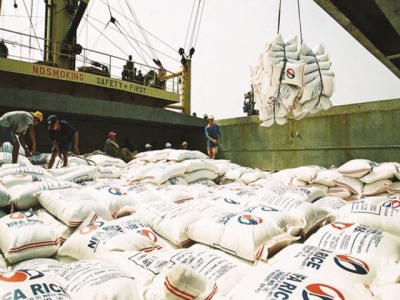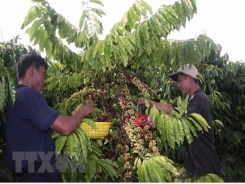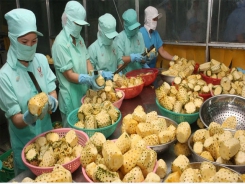Rice export business: Just loosening but not untying?

Recently, the Government issued the Decree 107/2018/ND-CP on rice export business, which has basically overcome the inadequacies in the Decree 109/2010/ND-CP on rice export business before, opening more opportunities for businesses. However, the Decree 107 has only loosened, created a favorable environment but has not changed management thoughts to completely "untie" for rice exports.
Although the Decree 107 has loosened, it has not really changed management thoughts of rice exports. Photo: ST.
Looser
According to the Decree 107, traders may export rice if: Have at least one specialized storehouse for storing paddy and rice in conformity with national standards and technical regulations on rice depots, which are promulgated by competent agencies according to the provisions of the Law on Standards and Technical Regulations; have at least 1 grinding facility or rice processing facility compatible with the national standards and technical regulations on warehouses and rice grinding and processing facility that are promulgated by competent agencies according to the provisions of the Law on Standards and Technical Regulations. The storehouse, grinding and processing facility may be owned or rented by the trader for at least 5 years.
According to the Decree 109, rice exporters must have at least one specialized warehouse with a minimum capacity of 5,000 tons of paddy, in line with the general regulations promulgated by MARD; Have at least 1 rice grinding facility with a capacity of at least 10 tons of paddy per hour, in line with the general regulations promulgated by MARD. At the same time, the warehouse, grinding facility must be owned by traders and must be located in the provinces or centrally-run cities where there exists rice for export or have international seaports engaged in rice export at the time when traders propose to grant the certificate.
Thus, comparing the two decrees, the burden of provisions on the storage scale of at least 5,000 tons and the minimum grinding capacity of 10 tons of paddy per hour has been abolished.
Notably, according to the Decree 107, exporters of organic rice, parboiled rice, and fortified rice do not need to meet the business conditions that are mentioned above. The traders who are allowed to export these types of rice do not need to have the certificate, do not have to carry out the circulation reserve and have the responsibility to report according to the regulations. When carrying out the customs procedures, the exporters of organic rice, parboiled rice, fortified rice without the certificate just need to present to the customs office the original or certified copy of the authorized agencies or the Inspection accredited certificate of rice exports issued by Inspection organizations in line with the law on the export of rice products in accordance with the criteria and methods determined by MARD, the Ministry of Health.
Regarding the content of the Decree 107, Mr. Dau Anh Tuan, Head of the Legal Department, Vietnam Chamber of Commerce and Industry (VCCI), said: Compared with the Decree 109, the Decree 107 is looser and simpler. The big difference is that instead of investing, owning a storage system and a grinding machine, the company can rent, although the lease period is quite long (5 years). The decree also reduced the stockpile requirement for rice exporters from 10% to 5% of export rice in the previous 6 months. This makes it much more convenient for small and medium sized enterprises, because instead of investing in big capital right from the beginning, now they get business certifications much more conveniently. "Particularly, for enterprises exporting organic rice, parboiled rice, fortified rice, if they have the certificate, they do not have to meet the business conditions or carry out the circulation reserve," said Mr. Dau Ahn Tuan.
Management thoughts have not changed yet
The Decree 109 is the one that export enterprises, organizations have been concerned about and recommended for many years. From 2010 up to now, it took 8 years to amend this Decree 109. Clearly, many businesses have missed their business opportunities, even small businesses have to leave this "play" because they cannot meet the conditions. In that context, Mr. Tuan emphasized: The issuance of Decree 107 is evidence of concrete action by the Government in reducing business conditions to promote the development of enterprises. However, according to Mr. Tuan: "One must be frank and admit that there has not been a dramatic change in the way of managing rice enterprises when they still have to ask for permission, ensure the conditions for business, and make many reports. The current approach is just loosening, simplifying and facilitating a part for the smaller businesses. The conditional criteria have certain exceptions but it seems that we still see the hesitation in moving to manage an item like many others.”
Around this story, Mr. Vo Hung Dung – an agricultural expert - assessed: The Decree 107 has not been amended much because the business condition, which is to have warehouses and grinding facilities is still retained. The decree did not significantly improve the management thoughts, it only loosened that the facilities could be hired instead of owned as before.
Deepening the content that enterprises must have warehouses and grinding machines according to the standards promulgated in the Decree 107, some experts have expressed concern that the Decree 107 does not set a hard number, but it gives this regulation to national technical standards, which will be issued later. Normally, the national technical standards will be in the form of ministerial circulars. If the issuance of them is not in line with the spirit of creating convenience and ease for rice exporters, the objective of the Decree 107 may not be achieved. In addition, the Decree 107 will take effect from 1st October. Only the late issuance of these standards will create difficulties in practical implementation.
Ms. Dang Thi Lien, Director of Long An Foodstuff Company Limited:
The Decree 107 basically has created more favorable conditions for enterprises engaged in rice export business. However, this Decree does not stipulate a floor price for rice exports, leading to unfair competition in the long run.
Có thể bạn quan tâm
Phần mềm

Phối trộn thức ăn chăn nuôi

Pha dung dịch thủy canh

Định mức cho tôm ăn

Phối trộn phân bón NPK

Xác định tỷ lệ tôm sống

Chuyển đổi đơn vị phân bón

Xác định công suất sục khí

Chuyển đổi đơn vị tôm

Tính diện tích nhà kính

Tính thể tích ao hồ




 Tea producers lose big money because of weak…
Tea producers lose big money because of weak…  Seminar discusses measures to boost exports of farm,…
Seminar discusses measures to boost exports of farm,…